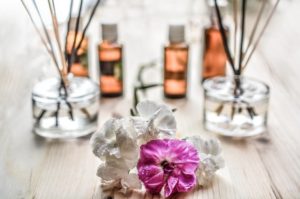Essential Oils and Emotional States: Part Two
In our last blog post, we delved into the neuroscience of smell and explored the effects that scents can have on your emotional states and wellbeing. While your conscious brain is busy identifying what it is you’re smelling, that scent can have a profound effect on your limbic system, including the amygdala (the emotion center in your brain). This is what makes essential oils such useful tools for reducing stress and improving how you feel throughout the day.
Various studies have tested the effectiveness of diffusing essential oils in hospitals to improve the emotional states of staff, with overwhelmingly positive results. Since essential oils can alter emotional states for the better, they can be a powerful intervention to help hospital staff and caregivers care for themselves as they care for their patients.
A recent study conducted by Dr. Rena Szabo, PsyD, CAADC, MA, Med, aimed to study the benefits of diffusing the DoTERRA Emotional Aromatherapy blends to help staff working in an oncology clinic. In today’s post, let’s take a closer look at Dr. Szabo’s study and what it means for caregivers and their patients.
Essential Oils Can Help Prevent or Reduce Compassion Fatigue in Caregivers
Around 37-44% of nurses, doctors, and other caregivers struggle with compassion fatigue, an emotional state brought on by the mental toll of caring for those in need. Among cancer care providers, this number can be even higher (32-78%). Compassion fatigue can cause a range of symptoms, including exhaustion, headaches, and weight loss, that can deeply impact a person’s work and wellbeing.
Over a 10 month period, Dr. Szabo studied the changing emotional states of staff in an oncology clinic after essential oils were introduced into the workplace. Six dōTERRA emotional oil blends (Motivate, Cheer, Passion, Forgive, Console, and Peace) were used, and staff members reported how they felt based on a range of 10 emotions.
Participants experienced a significant improvement in mood after the oils were introduced. At the start of the study, 75% of staff reported negative feelings, while only 25% reported positive feelings. By the end of the 10 month period, the number reporting positive feelings had risen to 42%—and this was not the only improvement Dr. Szabo and her team recorded.
Prior to the introduction of the oils, stress and feelings of being overwhelmed were common problems in the clinic. At the end of the study, the number of staff reporting work-related stress had dropped from 69% to 46%, while the percentage feeling overwhelmed almost halved (dropping from 61% to 32%). Although many staff still experienced some level of stress, they felt better equipped to handle it and more positive about their job.
Every oil blend that Dr. Szabo’s study used was found to increase relaxation and positive feelings among the staff. The Forgive and Cheer blends were especially effective for reducing negative feelings and increasing happiness, while Cheer also dramatically decreased feelings of anxiety.
These findings indicate that using essential oils can be an effective strategy for combating compassion fatigue in caregivers. Pleasant and mild, these scents could also help patients feel more relaxed, calm, and happy during their treatment.
Incorporating Essential Oils Into Your Lifestyle
In previous posts, we’ve looked at ways that essential oils like peppermint and lavender can be incorporated into your self-care regime to relieve fatigue and similar conditions. Whether you’re a caregiver, a patient, or simply want to reduce stress and negative feelings, essential oils can have a profoundly beneficial effect. Diffusing these oils or rubbing a drop onto acupoints on your skin during your daily acupressure massage can stimulate feelings of whole-body wellness, and bring health and vitality back into your life.
If you’re not sure how to begin, speak to your acupuncturist at your next session. We’re more than happy to discuss which oils are right for you and to answer any questions you might have.



